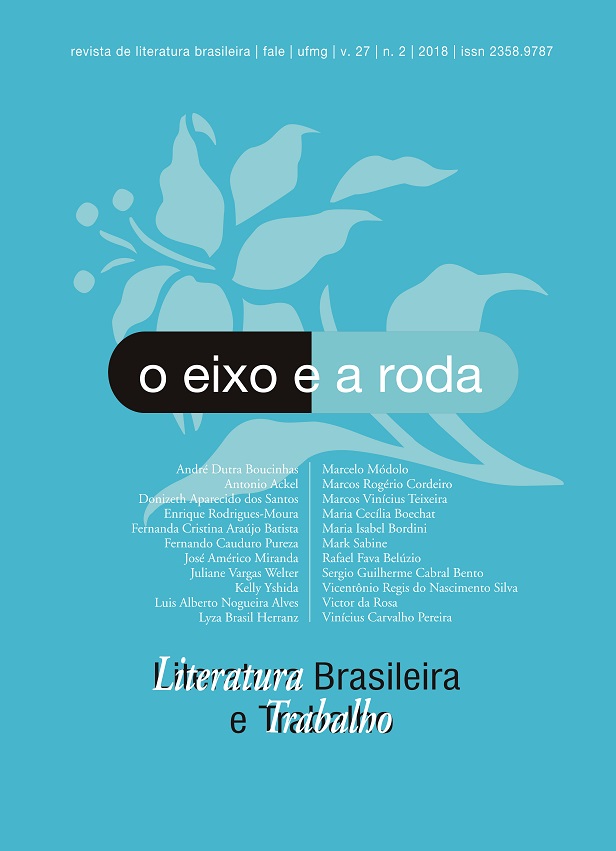Seminário dos ratos
uma análise de contos pela crítica genética
DOI:
https://doi.org/10.17851/2358-9787.27.2.247-264Palabras clave:
crítica genética, crítica textual, Seminário dos ratosResumen
Resumo: Este trabalho apresenta um estudo de crítica genética (GRÉSILLON, 1994) sobre três contos da obra Seminário dos ratos de Lygia Fagundes Telles: “As formigas”; “Senhor diretor” e “Tigrela”. Para esse fim, utilizou-se metodologia da crítica textual (SPINA, 1977), dando o primeiro passo para a elaboração da análise com a recensio, que trata não só do levantamento e utilização de todas as edições publicadas no Brasil, entre 1977 e 2009 (nossa proposta foi estudar a tradição impressa da autora, pois seus manuscritos, até a conclusão deste trabalho, não estavam disponíveis para consulta), mas também do processo da collatio, uma comparação entre esses contos, com a finalidade de ler Lygia em seus diferentes modos de escrever: com acréscimos e substituições. Ao se deparar com essa inquietação da autora, o leitor é levado a pensar para além de seus contos, o objeto de estudo torna-se instrumento de observação do uso linguístico de épocas diferentes, e não de textos variados com fim em si mesmos. É nesse momento que a pesquisa revela a complexidade da construção de um texto e conduz o leitor aos mesmos caminhos que a autora refez, questionando-o se, em suas escolhas lexicais ou organizações sintático-semânticas, sua intenção era mostrar a situação real do uso da língua naqueles momentos, ou se pretendia criar efeitos pragmáticos e semânticos distintos em suas estórias.
Palavras-chave: crítica genética; crítica textual; Seminário dos ratos.
Abstract:The purpose of this article is to outline what is involved in genetic criticism (GRÉSILLON, 1994) as presented in three tales from Seminário dos Ratos by Lygia Fagundes Telles: “As formigas”; “Senhor diretor” and “Tigrela”. The textual criticism methodology (SPINA, 1977) was the first step for the elaboration of the analysis with recensio, which includes not only the survey and use of all editions published in Brazil, between 1977 and 2009 (our proposal was to study the author’s printed tradition, her manuscripts, until the conclusion of this paper, were not available for consultation), but also the collatio process, a comparison between these tales, in order to read Lygia’s work in her different ways of writing: with additions and alterations. When comparing emendations in all of the available editions, the reader is led to think beyond her tales, which means, the object of study becomes an instrument of observation of the linguistic use of different time frames, and not only as texts are presented in books. This is the moment in which research discloses the complexity of text construction and takes the reader to the same paths that the author took, questioning whether they were lexical choices or syntactic-semantic organizations; whether her intention was to show the actual usage of language at that time, or whether they were intended to create distinct pragmatic and semantic effects in her tales.
Keywords: genetic criticism; textual criticism; Seminário dos Ratos.
Referencias
CARDEIRA, E.; MIRA MATEUS M. H. Norma e variação. Lisboa: Caminho, 2008
BENSON-ALLOTT, C. Killer tapes and shattered screens: video spectatorship from VHS to file sharing. Berkeley: University of California Press, 2013.
BLISS, H. E. The organization of knowledge in libraries and the subjectapproach to books. New York: The H. W. Wilson Company, 1933.
CASTILHO, A. Nova gramática do português brasileiro. São Paulo: Contexto, 2010
GRÉSILLON, A. Eleménts de critique génétique. Paris: P.U.F. 1994
GRÉSILLON, A. Elementos de crítica genética: ler os manuscritos modernos. Porto Alegre: UFRGS, 2007.
HAY, L. O texto não existe: reflexões sobre a crítica genética. In : ZULAR, R. (Org.). Criação em processo ensaios de crítica genética. São Paulo: Iluminuras, 2002. p. 29-44.
HOUAISS, A.; VILLAR, M. Dicionário Houaiss da língua portuguesa. Rio de Janeiro: Objetiva, 2001
SAVAZONI, A. T. “Sou uma escritora insatisfeita”, diz Lygia Fagundes Telles. Folha Online. Disponível em: < http://bit.ly/2FM9AzI>. Acesso em: 5 fev. 2018.
SPINA, S. Introdução à edótica: crítica textual. São Paulo: Cultrix, Edusp, 1977.










